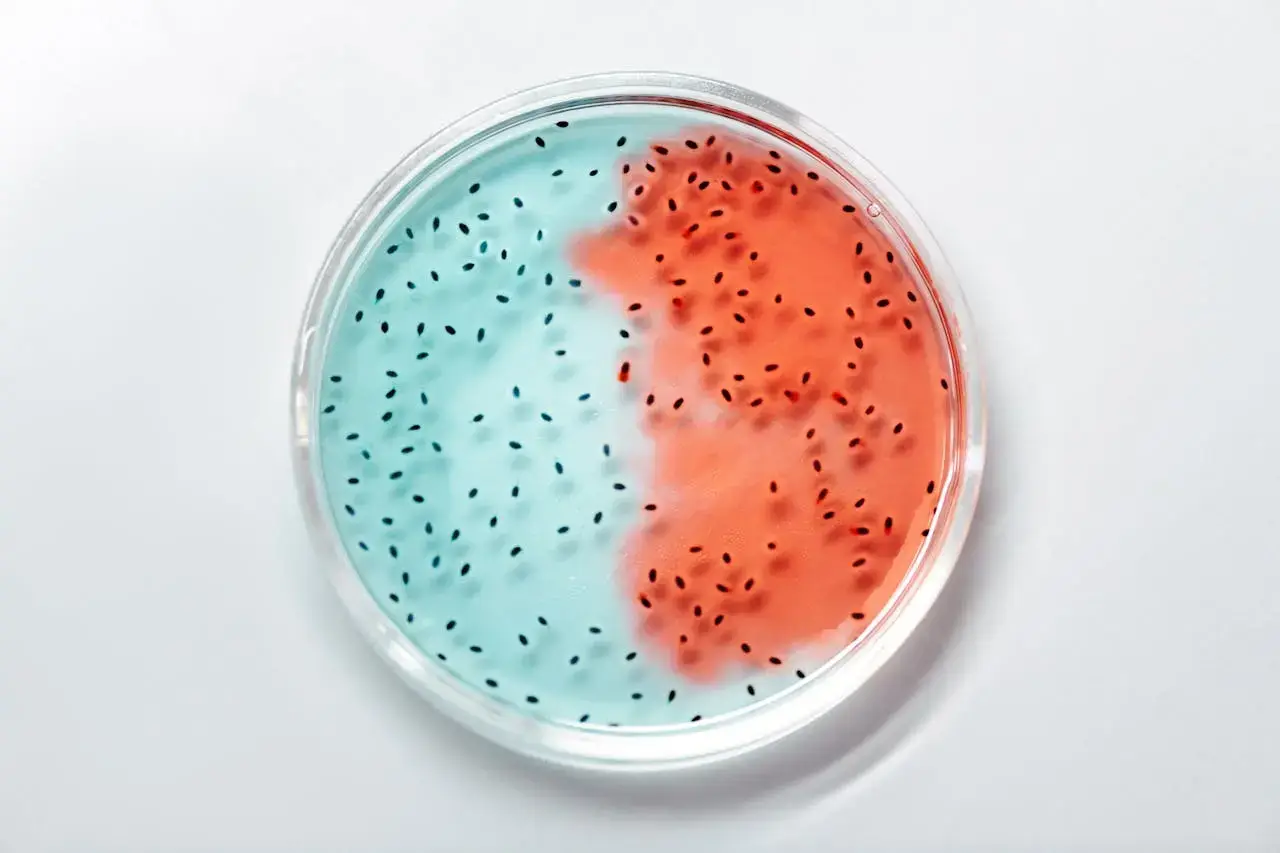Did you know that your body has more bacteria than human cells?


When you look in the mirror, you see a human being – but did you know that your body is actually made up of more bacterial cells than human cells? In fact, the gut microbiota alone contains over 100 trillion microorganisms!
These microorganisms, known as gut microbiota, play a crucial role in how we digest food, fight off diseases, and even how we feel mentally. But what are the most important bacteria in the gut, and why are they so essential?
What is microbiota, and why is it important?
The microbiota is made up of bacteria, viruses, fungi, and other microorganisms that live on and in your body. Most of them are found in the intestine, where they form a complex ecosystem.
The microbiota has several important functions:
- Digests fiber and complex carbohydrates that your body otherwise could not have utilized.
- Produces essential vitamins such as B12, K2 and folate.
- Regulates the immune system by training immune cells to distinguish between friend and foe.
Some of the most important bacteria in the gut
1. Akkermansia muciniphila – the protector of the intestinal barrier
This bacterium is one of the most studied in recent times. Akkermansia muciniphila lives in the mucous layer that protects the intestinal wall and helps maintain a strong intestinal barrier. A healthy gut barrier prevents harmful substances from leaking into the bloodstream, which can reduce inflammation in the body.
Studies have also shown that higher levels of Akkermansia are associated with a lower risk of obesity, type 2 diabetes, and metabolic syndrome.
2. Faecalibacterium prausnitzii – the body's anti-inflammatory bacterium
Faecalibacterium prausnitzii is one of the most abundant bacteria in a healthy gut, and it plays a crucial role in reducing inflammation. It produces butyrate, a short-chain fatty acid that serves as the main nutrient for intestinal cells and strengthens the intestinal barrier.
Low levels of Faecalibacterium prausnitzii are associated with conditions such as irritable bowel syndrome (IBS), inflammatory bowel disease (IBD), and even depression.
3. Bacteroides – the key to nutrient absorption
The bacteroides bacteria are essential for breaking down complex carbohydrates and fiber in the diet. They help the body extract nutrients from food and contribute to the production of short-chain fatty acids, which are important for gut health.
A healthy balance of Bacteroides may contribute to better blood sugar regulation and weight management, while an imbalance may be linked to obesity and metabolic diseases.
4. Lactobacillus – defender of the immune system
Lactobacillus is perhaps one of the most well-known probiotic bacteria and is often found in fermented foods such as yogurt and kefir. This group of bacteria helps maintain a healthy gut flora by producing lactic acid, which lowers the pH of the gut and prevents the growth of harmful bacteria.
Several studies have shown that Lactobacillus can reduce symptoms of irritable bowel syndrome (IBS) and improve the immune system.
5. Bifidobacterium – important from birth and throughout life
Bifidobacterium is one of the first bacteria to colonize our gut at birth, especially if we are born vaginally. It plays an important role in breaking down complex sugars in breast milk, which contributes to the development of a strong immune system in infants.
In adults, Bifidobacterium helps maintain a healthy gut flora and has been shown to reduce inflammation, improve digestion, and strengthen the immune system.
Why is it important to take care of your microbiota?
Your microbiota affects much more than just digestion – it's also closely linked to mental health, energy levels, and immune function. Studies have shown that an imbalanced gut flora can contribute to a variety of health problems such as irritable bowel syndrome (IBS) and inflammatory bowel diseases (IBD), autoimmune diseases such as arthritis and type 1 diabetes, obesity and insulin resistance, and neurological disorders such as depression and anxiety.
How can you support a healthy gut flora?
- Eat fermented foods: Include yogurt, kefir, kimchi, and sauerkraut in your diet to add good bacteria.
- Get enough fiber: Prebiotic foods like onions, garlic, asparagus, and bananas nourish the good bacteria.
- Avoid overuse of antibiotics: Antibiotics can disrupt the microbiota by killing both harmful and beneficial bacteria.
- Reduce stress: Stress can negatively affect the gut flora, so activities such as yoga, meditation, and good sleep can be beneficial.
Your gut bacteria work for you every day – they help you digest food, strengthen your immune system, and even affect your mood. Research shows that a varied and balanced gut flora is crucial for good health.
By understanding which bacteria are most important, and how you can support them, you can take better care of your body's "hidden organ" – your microbiota! Prokarimi's microbiota test gives you answers to how your gut is doing. It tells you which bacteria you have a lot of and which you have little of – and if there is an imbalance.
Referanser
- Cani, P. D., & de Vos, W. M. (2017). Next-generation beneficial microbes: The case of Akkermansia muciniphila. Nature Reviews Gastroenterology & Hepatology, 14(10), 573-574. https://doi.org/10.1038/nrgastro.2017.153
- Wexler, A. G., & Goodman, A. L. (2017). An insider’s perspective: Bacteroides as a window into the microbiome. Nature Reviews Microbiology, 15(5), 375-386. https://doi.org/10.1038/nrmicro.2017.6
Ansvarsbegrensning:
Selvdiagnostisering og behandling anbefales ikke. Det er viktig å konsultere helsepersonell ved eventuelle tarmrelaterte bekymringer.
Denne artikkelen er kun ment til informasjonsformål og bør ikke oppfattes som medisinsk informasjon eller instruksjoner. Hvis du har noen helseproblemer, anbefaler vi at du kontakter en lege eller annet helsepersonell.




